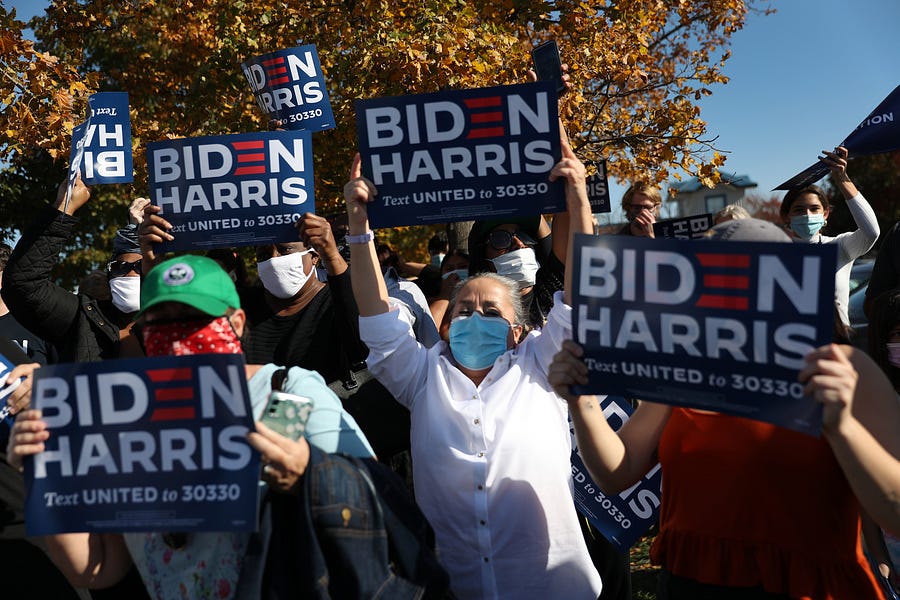It took a few days, but we now know that Joe Biden will be the 46th president of the United States. CNN called the election for him late Saturday morning, and other media outlets followed quickly. A massive advantage in early and mailed-in ballots in the state of Pennsylvania (Biden was born in Scranton) allowed the former vice president to overcome President Donald Trump’s large early lead in the state and secure a victory in the Electoral College. (The final margin is still to be determined.)
Biden will have to work with Democrats and Republicans in a narrowly divided Congress. Democrats are on track to maintain control of the House of Representatives, but with a smaller majority, and the GOP can still maintain control of the Senate, pending two runoff elections in Georgia. Biden will also be the oldest person to serve as president—Ronald Reagan was 77 when he left office in 1989.* Biden turns 78 later this month.
Biden released a video Saturday promising to be a president “for all Americans.”
Donald Trump is the first incumbent to lose reelection since George H.W. Bush in 1992. However, we should not expect a concession from the president anytime soon. He released the following statement Saturday: “The simple fact is this election is far from over. Joe Biden has not been certified as the winner of any states, let alone any of the highly contested states headed for mandatory recounts, or states where our campaign has valid and legitimate legal challenges that could determine the ultimate victor.”
Other Republicans, though, are acknowledging Biden’s win:
He’s not a Republican, but Conservative British Prime Minister Boris Johnson also weighed in:
Despite those claims, one thing we should all be grateful for, regardless of how anyone feels about the outcome, is that voting went as well as it did. When the coronavirus pandemic started interfering in primary elections, the implications for November became clear. States would have to find ways to make voting safe and also to maintain electoral integrity. The unexpected—and massive—increase in mail-in ballots during primary season in the spring led to concerns that hundreds of thousands or even millions of absentee ballots would be discarded because voters accidentally filled them out or sent them in incorrectly. The postal system could be overwhelmed and keep ballots from arriving on time.
States mobilized. They changed election laws to increase early voting; they made provisions to start counting ballots early or to extend deadlines for them to be counted. It wasn’t perfect, but it was much better than it could have been.
We have yet to see how long President Trump will fight the outcome. But over the past few days, he’s worked to cast doubt on the legitimacy of the election, claiming in a speech from the White House on Wednesday morning that it was being stolen. Some of his supporters have internalized his claims, which he telegraphed even in advance of the election and then made explicit after voting ended.
All of it kept our fact checkers, Alec Dent and Khaya Himmelman, very busy this week. Very busy. The Dispatch is part of Facebook’s fact-checking network, and the articles we write are sometimes used as a reference when Facebook puts a warning on articles that contain misinformation. And so that means we have the ability to see the posts and articles that Facebook users have reported as potentially false. Let’s just say there’s a reason we use the term “viral” a lot. One bad meme or a chart taken out of context gets picked up by a few people, and all of a sudden it’s everywhere.
Here are the fact checks we published this week:
-
Did Arizona Poll Workers Give Out Sharpies To Prevent Votes From Being Registered?
-
Did Wisconsin Turnout Exceed the Number of Registered Voters?
-
Have 40,000 Absentee Ballots Been Rejected in One Georgia County?
-
Did Philadelphia Really Report ‘23,277 votes … all for Biden’ in One Update?
-
Does a Video Show Someone Burning Ballots With Votes for Trump?
-
Did Michigan’s Election Website Show Donald Trump Winning the State?
-
Do Viral Videos Show Poll Workers Filling Out Empty Ballots?
All of these claims, with the exception of the absentee Georgia ballots (which seemed like honest confusion and could actually have hurt Joe Biden if true, given his general advantage in mailed-in ballots), were shared to bolster the claim that the election was stolen from Donald Trump. And all of them, with the exception of the claim that Pennsylvania reported a batch of ballots all for Biden, were false. (Even that one was missing some context.)
I want to share one surreal moment. It’s one thing when people share bad memes and text their friends about how the “MSM” is sticking it to Trump. It’s another to watch people take those sentiments into the streets. We published our fact check Wednesday about the allegation that Sharpie markers were distributed in Arizona so that ballots couldn’t be registered. (They work just fine.) On Wednesday night, Trump supporters gathered outside of the Maricopa County facility where ballots were being counted, and CNN reported that the protesters were angry about the manufactured Sharpie controversy. We were hardly the only outlet to fact check the claim, and both the Arizona secretary of state and Maricopa County officials addressed it proactively. And … it didn’t matter.
There has been so much discussion since 2016 about people living in “bubbles”—and they exist on both sides. (One of the best Saturday Night Live skits that followed that election tweaked lefties who wanted a safe space.)
I feel grateful that I have friends across the political spectrum, from ardent Trump supporters to passionate progressives. (And some who don’t give a whit about politics!) We know our audience at The Dispatch is diverse and we’re grateful for that, and for the sane and respectful conversations you have in the comments.
But many folks in bubbles have gone from merely surrounding themselves with people who share their opinions to essentially creating their own “facts.” It’s not that we can no longer persuade people who have different opinions on economic policy or immigration or health care. We have reached a point where we can’t convince them that the sky is blue, because someone told them it was green.
I remain hopeful, with the result now being determined, that our collective fever will subside. But sometimes that feels overly optimistic. Anyhow, I’ve gone on a little longer than I intended and definitely gave you some homework with all those fact checks, so I’m going to depart from my usual format and just highlight a few things we did this week to analyze the election. Thanks for reading.
David also weighs in on the pervasiveness of the disinformation we saw this week, drawing attention to claims by Trump, administration officials, and right-wing media figures. He highlights an especially misleading tweet by Mark Levin, who suggested that state legislatures have the final say over choosing electors (that’s actually what voters are doing at the polls, of course). “To be clear, this is a call for Republican legislators to defy existing state laws, defy contrary court rulings, and defy the majority of their own state’s voters (as evidenced by the actual vote count) to independently reinstall Trump as president.”
Fox News is the preferred news network of conservatives, and its primetime lineup is dominated by personalities like Tucker Carlson and Sean Hannity. So it surprises some that its decision desk plays it straight every four years on Election Night. We were reminded of that on Tuesday night, when Fox News called Arizona for Joe Biden. Audrey wrote about Arnon Mishkin, the man behind the decision desk.
Jonah makes an important distinction between the government and the “State” and explains why they should be seen as two different things. “The government in the American tradition is the place where people who disagree about public policy argue, barter, negotiate, haggle, and posture. The State is some mystical entity that represents the national soul or the volksgemeinschaft or something.” His hope is that a Biden administration forced to work with a Republican Senate will restore the concept of governance. “The fights between those two is what government is supposed to be about in a free society, and in our constitutional order.”
And we can’t forget the podcasts: Jonah discussed the election and the (then still ongoing) vote-counting process with friend and fellow rank pundit Jim Geraghty on The Remnant. David and Sarah shot down the idea that voter fraud is a widespread and pervasive problem on Advisory Opinions. And on The Dispatch Podcast, Steve welcomed Andrew, Alec, and Khaya to talk about fact checking.
Photograph by Joe Raedle/Getty Images.
Correction, November 7 2020: An earlier version of this newsletter misstated the year Ronald Reagan left office. It was 1989, not 1992.









Please note that we at The Dispatch hold ourselves, our work, and our commenters to a higher standard than other places on the internet. We welcome comments that foster genuine debate or discussion—including comments critical of us or our work—but responses that include ad hominem attacks on fellow Dispatch members or are intended to stoke fear and anger may be moderated.